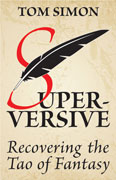#9 in a series, following ‘Sock Puppet, son of Sock Puppet’. An earlier version appeared on LiveJournal in May, 2006.
Prigs, by and large, are euphemists. Although it was Heinlein who invented (or at least publicized) the term speculative fiction, it was the prigs of the field who fastened upon it as their preferred substitute for the indecently descriptive name science fiction. Thirty or forty years later, the prigs of another field, shrinking from the straightforwardness of the word horror, cast about for a suitably pretty substitute and came up with dark fantasy.
Millions of ordinary readers like stories about science, or stories about things that frighten them; they seek them out. To a prig, this will not do; and so he must demonstrate his superiority to the rabble (as Ted Nelson put it) by calling a spade a muscle-powered terrain disequilibration system. Both terms, thankfully, have gone rather out of fashion since their first vogue. ‘Speculative fiction’ was simply too ugly for anyone but a prig to use, and in any case it clashed violently with the older and more useful term ‘writing on speculation’, or ‘on spec’, meaning the nearly universal practice of writing a story before it is sold.
‘Dark fantasy’ was eclipsed for a less encouraging reason: the adjective no longer draws a distinction. [Read more…]
[Read more…]









Recent Comments